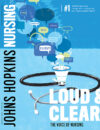Story by Steve St. Angelo | Illustrations by Matt Chinworth
As more nurses earn top roles in health care, their words carry extra weight—undergirded by compassion, evidence, experience.
There is speaking up and speaking out, and there is hearing … and being heard.
Since its birth 130 years ago, the Johns Hopkins School of Nursing has built and sent into the world caregivers who, when they see something, say something, and then set about fixing it. Today, having grown through two World Wars, a Great Depression, and a health care provider shortage that demanded it, nurses are seeing their vision, persistence, and problem-solving pay off with earned positions at the very top of health institutions like the Johns Hopkins Health System—and even in Congress.
“We will hear, we will learn, we will innovate, and we will be heard from,” says Patricia M. Davidson, dean of the Johns Hopkins School of Nursing (JHSON). Doctoral nursing education is a huge driver here, offering nurses the credentials to buttress practical and leadership skills and to push open doors into the corridors to power.
“We will hear, we will learn, we will innovate, and we will be heard from.”With that power comes responsibility, of course. Rather than critique and tweak existing systems, nurses now must build or reorganize them correctly the first time, or it’s on them. “Nurses wouldn’t have it any other way,” Davidson insists.
And so nurses are making their voices heard on health policy, on violence, on diversity, equity, and inclusion, and about the very future of health care as a profession and as a business.
Get a Head Start
“I’m not just a crass business guy,” says Kenneth Dion, PhD, MSN, MBA, a nurse entrepreneur, inventor, scholar, and a 30-year veteran of the health care industry. Dion is a founding principle at TurnPath LLC, a health care technology innovation incubator, and recently became JHSON assistant dean for business development and strategic relationships.
But Dion, until very recently a proud resident member of the Grays on Trays—an experienced band of snowboarders in Breckenridge, CO—sees the mountain for what it is:
Change is coming to nursing education, Dion explains, and those who aren’t riding its leading edge will soon be chasing it. Dion,
as you can imagine, prefers not to be among the second type. A former firefighter-paramedic, he recognizes an emergency when he sees it. “Our iceberg is melting,” he says of traditional nursing education.
Take online education, for which JHSON recently received a No. 1 U.S. News & World Report ranking. Dion has had a peek at what’s coming—in online education, in simulation, in telemedicine and phone app technology—thanks to his connections throughout the heath care and tech industries. And he warns against resting on any such laurels.
So he is eager to help JHSON not only continue to fully embrace online education, for instance, but to reimagine it. To maximize access and collaboration and to recognize opportunities to lead in the business of health care. To develop nurses who are not only the best caregivers of today but the innovators of tomorrow. For those institutions that can’t or won’t adapt, he says, it’ll very likely be all downhill—without a snowboard.
Prioritize Diversity
Diversity is not a new concept at JHSON. Through fits and starts as well as leaps and bounds—though always with intent—the school has built its student body up to 37 percent representation of racial and ethnic minorities and its faculty to about 25 percent minority representation. The school earned the 2018 INSIGHT Into Diversity Higher Education “Excellence in Diversity” Health Professions Award for its efforts to support and sustain diversity and inclusion through education, programs, and outreach. The HEED Award is the only national honor that recognizes individual health institutions showing outstanding achievement in making diversity a top priority.
“Diversity is an underlying current that drives our innovation and success, and inclusion is what provides a sense of true community at our school.”
“Diversity is an underlying current that drives our innovation and success, and inclusion is what provides a sense of true community at our school,” Davidson insists. “There’s no doubt that our varying backgrounds and beliefs help us achieve the best outcomes for our school and the local and global communities that we serve.” Yet more work remains. It is why Gloria Ramsey, JD, RN, FAAN, was recently appointed to serve as inaugural associate dean for diversity, equity, and inclusion (or DEI: “because we need another nursing acronym,” she jokes).
At JHSON, diversity, equity, and inclusion are embedded into the strategic plan and overall mission. Faculty, students, and staff are provided opportunities for collective cultural changes and experiences through encouragement from leadership and the school’s Diversity and Inclusion Committee. Overarching efforts to promote respect for differing views and backgrounds are woven into curriculum development, scholarships, recruitment, partnerships, and strategy.
DEI highlights include the appointment of Sarah L. Szanton, PhD, ANP, FAAN, as inaugural Endowed Professor in Health Equity and Social Justice and JHSON’s recognition as the most diverse PhD program across the university. Professor Phyllis Sharps, PhD, RN, FAAN, earned Modern Healthcare’s Diversity in Nursing Award, was named 2019 Black Nurse of the Year by the Black Nurses Association of the Greater Washington, DC Area, and was a 2018 finalist for the JHU Provost Prize for Faculty Excellence in Diversity. The school holds a Faculty and Staff Diversity Retreat each year and, in March, hosted a university-wide Race in America Forum.
“As we celebrate the progress we have made, we continue to hold ourselves accountable to continue important work, be open to new ideas, and think forward toward creating a more diverse and inclusive environment in the future.”
“Our commitment to DEI is clearly evident and well integrated into the operations of the school,” says Ramsey. “Our entire community should feel proud and honored to receive the HEED Award because it represents a collective effort and underscores our values and commitment to inclusive excellence for 21st century nursing. As we celebrate the progress we have made, we continue to hold ourselves accountable to continue important work, be open to new ideas, and think forward toward creating a more diverse and inclusive environment in the future.”
Care on the Ground
Two-thirds of U.S. adults suffer from multiple chronic conditions, a growing worry for a health care industry stretched to the breaking point by aging and often underserved populations. The new National Institutes of Health-funded PROMOTE Center (short for Promoting Resilience in Persons with Multiple Chronic Conditions) at JHSON is built to do much more than simply treat symptoms as they appear and then stand by as illnesses linger.
Its person-centered, community-focused methods address factors like functional limitations, poverty, housing, access to food, traumatic life events, or family caregiving situations that can exacerbate the cycle of chronic care.
The center uses a common-sense framework that emphasizes health resilience and recovery rather than treatment of individual diseases, clearing obstacles and tapping into factors that increase one’s ability to overcome a health challenge. So the question changes “from ‘What is the matter?’ to ‘What matters most?’ to the person,” explains Szanton, also the PROMOTE director.
If that sounds a little like CAPABLE, Szanton’s program that has changed the paradigm of care, safety, and quality of life for residents aging in place—through simple, smart, inexpensive means—it’s by design.
“It’s not just a leadership opportunity for our school, but a transformational advancement for the whole of health care.”
“Establishing this center will lead to a tremendous step forward in the way health care professionals respond to and design future interventions to the most pressing health issues,” says Davidson. “It’s not just a leadership opportunity for our school, but a transformational advancement for the whole of health care.”
Is There a Nurse in the House?
Horribly fractured along party lines, the United States Congress is a legislative body truly in need of nursing. It recently added a healthy dose of compassion and healing energy courtesy of Lauren Underwood, a Democrat elected in November as the youngest black woman ever to serve in Congress and the first person of color to win in Illinois’ 14th District. (Underwood is a 2009 JHSON graduate.)
“I am dedicated to using my voice and my vote to ensure all Americans have access to quality, affordable care.”And Underwood is wasting little time speaking up:
As someone who knows what it’s like to be in a hospital bed.
As a former senior adviser at the U.S. Department of Health and Human Services (HHS), appointed by President Barack Obama to help communities across the country prevent and respond to natural and manmade disasters and public health emergencies. (At HHS, Underwood helped implement the Affordable Care Act.)
As a teacher of future nurse practitioners through Georgetown University’s online master’s program.
As a black woman who has had to work twice as hard and be twice as good to be heard and recognized for her accomplishments.“My experience as a person with a heart condition and as a nurse caring for patients with pre-existing conditions inspired me to dedicate my career to improving the health and well-being of individuals and populations. I am so grateful for the opportunity to serve in Congress—especially as one of only two nurses—and am dedicated to using my voice and my vote to ensure all Americans have access to quality, affordable care.”
The nation just might be ready to listen.

